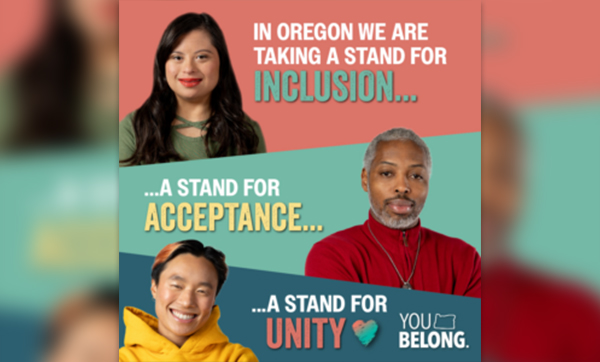An Oregon hotline for people to report instances of hate and bias — such as a person tearing down a pride flag or defacing books authored by people of color — saw more calls in 2023 than any year prior.

An advertisement from the Oregon's Department of Justice aims to spread awareness of the state's nonemergency hotline for reporting bias and hate crimes to support minority communities.
Courtesy of Oregon Department of Justice
The Bias Response Hotline received 3,623 calls last year, up 25% from 2022, according to the latest annual report from the Oregon Department of Justice. Calls have risen every year since the hotline started in 2020, officials said.
“Acts of bias and hatred are cruel and cowardly, and they deny people the dignity of safety and belonging every Oregonian deserves,” Attorney General Ellen Rosenblum said in a statement.
People can call the hotline to report crimes and non-crimes alike – as well as events from their past, said Johanna Costa, bias response coordinator at the justice department. A typical call lasts 48 minutes, she said.
“It looks different for every caller,” Costa said. “Some folks want to be heard. Other folks are looking for ‘So what are my options?’ They may be looking for accountability.”
According to the report, callers have noted a broad spectrum of actions: from individuals performing a Nazi salute to race-based violence. About one in five calls were determined to be crimes.
More people are learning about the hotline, Costa said. Major news events, such as the killing of George Floyd by Minnesota Police Department officers or the war in Gaza, can cause more calls as well.
“I think we’re seeing both an increase in awareness of the hotline as a resource, as well as an increase in the conduct that’s targeting communities impacted by inequity,” Costa said.
The report offers granular insights into different groups of people and the kinds of bigotry they reported. Occurrences may be trending upward for some demographic groups while declining for others, DOJ officials found. Reports from Asian victims peaked in 2021, the report said, while Black victims have consistently reported the most over the years.
Still, the hotline’s data is very likely just a glimpse of a much bigger problem.
“It is apparent that underreporting is extensive,” wrote the report authors from the Criminal Justice Commission, a state agency that helps develop criminal justice policy. “Reporting rates differ by victim and community factors, such as language barriers, cultural barriers, fear of deportation.”
To motivate more reporting, the authors recommended that law enforcement agencies statewide release their own bias crime data on a regular basis.
The report also looked inward at the Oregon Department of Justice, saying the agency should consider tweaking its policies to ensure staff who handle calls can get help if a call – about domestic violence or child abuse, for example – is emotionally disturbing.
The report listed several key findings:
- Bias incidents involving the caller’s race, nationality or skin color spanned the gender spectrum, with all people reporting incidents.
- Females and people of undisclosed gender tended to report more instances of being targeted for their religion.
- Communities of color significantly reported being targeted for their race: 95% of reports from Black people were related to skin color, while 76% of reports from Asian people and 63% from Hispanic people indicated such discrimination.
- White people and people of undisclosed race reported being targeted primarily for their sexual orientation or gender identity.
Washington lawmakers in March passed a bill to launch their own hotline. It is poised to roll out statewide in 2027.
